Little Women
 By Mark Adamo
By Mark Adamo

 By Mark Adamo
By Mark Adamo
We are honored to return to the Macomb Center for the Performing Arts for the third year in a row to share our art with our larger Metro Detroit community. Likewise, we are pleased to work very closely with William Wood, newly appointed Director of Cultural Affairs and Community Engagement for Macomb Community College, and his dynamic team.
Little Women is a story that has been read, performed and discussed for decades, and we are proud to present it to you today in the art form we know best: opera. Our art form is multidimensional, encompassing instrumental music, singing, poetry and drama, and often intensifies the emotions experienced through the characters on stage.
Today’s production features performers from our Michigan Opera Theatre Studio, a resident artist program now in its second year. This program provides emerging artists advanced training and performance opportunities as part of our mission to support the next generation of opera singers. We are delighted to showcase these truly incredible young artists and encourage you to take note as their careers evolve.
We are pleased to welcome composer Mark Adamo as a special guest for Little Women and invite members of the Saturday evening audience for a talkback session following the performance. We also welcome Lawrence Edelson to Michigan Opera Theatre as Director of Little Women and are delighted that he has joined forces with our team for this production.
Our performance of Little Women also marks the beginning of the second half of our 2016-17 opera season, which includes two remaining operas, each with its own special significance to Michigan Opera Theatre. April 1-9, we will present Giacomo Puccini’s Girl of the Golden West, conducted by Stephen Lord in his first production since being named Principal Conductor last fall. May 13-21, we honor our Founder and Artistic Director David DiChiera with a presentation of his opera Cyrano, and a Grand Salute on May 19 to celebrate his retirement and transition to Artistic Director Emeritus after 46 seasons with Michigan Opera Theatre.
We look forward to exciting seasons ahead with Stephen Lord as Principal Conductor. Soon, details of the 2017/18 season will be announced. We invite you to subscribe and join us for the exciting opera and dance programs that will take place on the Detroit Opera House stage and throughout our community. We hope you enjoy today’s performance and that you will continue to join us for exciting productions ahead!

Warm wishes,
Wayne S. Brown President and CEO, Michigan Opera Theatre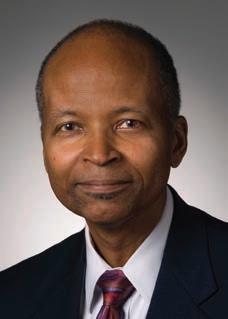
When I founded Michigan Opera Theatre, I was determined that we would not only present world-class operas but also nurture the next generation of singers. Art is a gift that is meant to be shared with others, through presentation but also through teaching. Every artist was once a student, and I believe opera fans everywhere will recognize the value of preserving their beloved art form.
With Little Women, I am proud to present to you five outstanding up-and-coming artists currently in residence in our Michigan Opera Theatre Studio young artists program who are featured in this production These singers include Briana Elyse Hunter as “Jo,” Joseph Michael Brent as “Laurie,” Angela Theis as “Beth,” Jeff Byrnes as “John Brooke,” and Brent Michael Smith as “Friedrich Bhaer.” Under the leadership of renowned tenor Richard Leech, these singers have worked with master coaches from all over the world and performed in a variety of environments ranging from community events to board meetings to full-length Michigan Opera Theatre operas, including the one you will see today. I have been honored to get to know these individuals personally and look forward to seeing how each one will progress in their careers.
This season marks my last as Artistic Director of Michigan Opera Theatre. For 46 years, I have been honored to work with some of the most talented artists around the world, to restore the Detroit Opera House and to witness the positive changes of our beloved city first-hand. It has been one of the proudest achievements of my life to watch this opera company grow from a “crazy” idea in 1971 to a successful cultural institution serving the people of Michigan. It was a dream I could have never achieved on my own, and I am grateful for the ongoing trust and support from my colleagues, donors, patrons and the larger Metro Detroit community.
As we look to the future, I am proud to welcome Stephen Lord to the leadership team of Michigan Opera Theatre as Principal Conductor through the 2018-19 season. I hired Stephen as a coach/accompanist in 1975, and he has since become a world-renowned artist who has been a frequent conductor with Michigan Opera Theatre. With Stephen alongside President & CEO Wayne Brown, I know MOT is in good hands and hope you will join me in experiencing the great remaining productions of this season and the seasons to come.
Warm wishes,
Dr. David DiChiera Founder and Artistic Director, Michigan Opera Theatre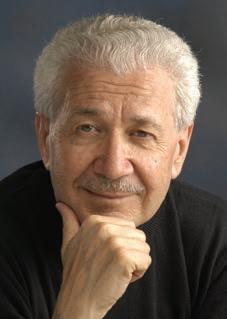
Welcome! We are so pleased you have joined us for this performance. Whether it is a national touring production or one of the performing organizations in our region, the Macomb Center for the Performing Arts is dedicated to presenting the finest in arts and entertainment. Michigan Opera Theatre (MOT) is one of the great cultural gems in our region. We are pleased and proud to have them perform at the Macomb Center.
Today’s production of Little Women promises to be one of the highlights of our season. This quintessential American tale set to music in 1998 by American composer Mark Adamo is sure to delight. The original libretto by Adamo also includes text by John Bunyan, Johann Wolfgang von Goethe and Louisa May Alcott herself. These elements combine into a magnificent production, magnificently performed.
We value our collaboration with community partners like MOT. These collaborations are vital to insuring a strong and dynamic cultural community in this region. They insure that Macomb Community College is able to offer cultural and artistic diversity that is crucial for a vibrant community. It also allows us to bring world-class performers and performances to the people of Macomb County.
We appreciate you joining us for the production and your support of the Macomb Center and Macomb Community College.
William R. Wood Director of Cultural Affairs and Community Engagement Macomb Community College
The Macomb Center for the Performing Arts (MacombCenter.com) is a community enrichment program of Macomb Community College dedicated to providing a diverse range of cultural enrichment experiences, and to inspire and encourage artistic expression through education, performance and volunteer opportunities. Hosting more than 100,000 visitors annually, the Macomb Center presents high-quality professional performances, offers educational outreach in the arts, provides a performance venue for community-based arts organizations, and, in partnership with the adjacent Lorenzo Cultural Center, creates unique opportunities for multifaceted cultural programming.
Join in this season-long tribute to our founder, David DiChiera. Please be sure to mark your calendar, as you won’t want to miss a moment of this historic season!
David DiChieraSAT. MAY 13, 2017 – 7:30 P.M.
WED. MAY 17, 2017 – 7:30 P.M.
SAT. MAY 20, 2017 – 7:30 P.M.
SUN. MAY 21, 2017 – 2:30 P.M.
Detroit Opera House
May 19, 2017
Michigan Opera Theatre will honor Founder and Artistic Director David DiChiera with a “Grand Salute” tribute concert as he transitions to Artistic Director Emeritus at the end of the season. The event will be a star-studded performance featuring artists from around the globe whose careers have been impacted by Dr. DiChiera. The performance will be followed by a sponsorship dinner at the Detroit Athletic Club and a “Bravo Salute” young patron party in the Detroit Opera House and coincide with a major legacy announcement. For tickets and additional information visit www.michiganopera.org.

July 1, 2016 - June 30, 2017
R. Jamison Williams Chairman
Wayne S. Brown President and CEO
Enrico Digirolamo Chair, Finance Committee
Cameron B. Duncan Treasurer
C. Thomas Toppin Secretary
Margaret Allesee
Pernilla Ammann
Lee Barthel
Richard A. Brodie
Elizabeth Brooks
Robert Brown
James Ciroli
Joanne Danto
Julia Donovan Darlow
Ethan Davidson
David DiChiera
Shauna Ryder Diggs Sonal Dubey
Michael Einheuser
Marianne Endicott
Paul E. Ewing
Jennifer Fischer
Barbara Frankel
Herman Frankel
Dean Friedman
Richard G. Goetz
John P. Hale
David Handleman
Devon Hoover
Danialle Karmanos
Barbara Kratchman
Thomas M. Krikorian
Alphonse S. Lucarelli
Donald Manvel
Ali Moiin
Nora Moroun
Stephen Munk
Peter Oleksiak
Charlotte Podowski
Paul Ragheb
Ruth Rattner
Roy S. Roberts
Bernard Rubin
Ankur Rungta
Elham Shayota
Terry Shea
Matthew Simoncini
Richard Sonenklar
Lorna Thomas
Jesse Venegas
Dale Austin
Shelly Cooper
Marjorie M. Fisher
Jennifer Nasser
Audrey Rose
William Sandy
Richard Webb
Jennifer Haase, Frank Cusumano, Katherine Lorenzo, Roseanne DiMaria, Kristi Dean, Joseph DeSantis, Vincent Viviano
Kenn and Liz Allen
Robert and Margaret
Allesee
Sarah Allison
Daniel and Pernilla
Ammann
Lourdes V. Andaya
Harold Mitchell
Arrington
Jonathan and Paula Autry
Beverly Avadenka
Lee and Floy Barthel
Mark and Caprice Baun
Ginny Berberian
Madge Berman
Debra Bernstein-Siegel
Joseph and Barbra Bloch
John and Marlene Boll
Gene P. Bowen
Richard and Gwen
Bowlby
Betty J. Bright
Richard and Joanne Brodie
William and Elizabeth Brooks
Robert and Geraldine Ford Brown
Wayne S. Brown and Brenda Kee
Thomas and Vicki
Celani
Michael and Mary Chirco
James and Elizabeth Ciroli
Gloria Clark
Avern and Lois Cohn
Thomas Cohn
William and Kelly
Connell
Peter and Shelly
Cooper
Joanne Danto and Arnold Weingarden
Helen Daoud
Julia D. Darlow and John C. O’Meara
Jerry and Maureen
D’Avanzo
Lawrence and Dodie David
Ethan and Gretchen Davidson
Kevin Dennis and Jeremy Zeltzer
David DiChiera
Karen VanderKloot
DiChiera
Douglas Diggs and Shauna Ryder Diggs
Enrico and Kathleen
Digirolamo
John and Debbie
Dingell
Mary Jane Doerr
Dilip and Sonal Dubey
Cameron B. Duncan
Michael Einheuser
Kenneth and Frances
Eisenberg
Marianne Endicott
July 1, 2016 - June 30, 2017
Alex Erdeljan
Fern R. Espino and Thomas Short
Paul and Mary Sue Ewing
Margo Cohen Feinberg and Robert Feinberg
Oscar and Dede Feldman
David and Jennifer Fischer
Marjorie M. Fisher
Carl and Mary Anne Fontana
Elaine Fontana
Barbara Frankel and Ron Michalak
Herman and Sharon Frankel
Dean and Aviva Friedman
Barbara Garavaglia
Yousif and Mara
Ghafari
Richard and Aurora Goetz
Carolyn Gordon
Reva Grace
Samuel and Toby Haberman
Alice Berberian Haidostian
John and Kristan Hale
David and Rose Handleman
Eugene and Donna Hartwig
Doreen Hermelin
Derek and Karen Hodgson
Alan and Eleanor Israel
Una Jackman
Don Jensen and Leo Dovelle
Kent and Amy Jidov
Gary and Gwenn Johnson
George and Jill Johnson
Ellen Kahn
Peter and Danialle Karmanos
Patrick J. Kerzic and Stephanie Germack
Kerzic
Michael and Barbara Kratchman
Thomas and Deborah
Krikorian
Melvin A. Lester
Linda Dresner Levy and Edward Levy
Mado Lie
Arthur and Nancy Liebler
Mary Alice Lomason
James and Marion LoPrete
Alphonse S. Lucarelli
Denise Lutz
Donald Manvel
Florine Mark
Ronald and Zvezdana Martella
Jack Martin and Bettye Arrington-Martin
Florence McBrien
Benjamin Meeker and Meredith Korneffel
Eugene and Lois Miller
Phillip D. and Dawn Minch
Monica Moffat
Ali Moiin and William Kupsky
Manuel and Nora Moroun
Stephen and Barbara Munk
E. Michael and Dolores Mutchler
Allan and Joy Nachman
Irving Barbara Nusbaum
Juliette Okotie-Eboh
Peter and Mary Oleksiak
Linda Orlans
Graham and Sally Orley
Richard and Debra Partrich
Spencer and Myrna Partrich
Daniel and Margaret Pehrson
Robert E. L. Perkins
Brock and Katherine Plumb
Charles and Charlotte Podowski
Waltraud Prechter
Paul and Amy Ragheb
John and Terry Rakolta
Ruth F. Rattner
Roy and Maureen Roberts
Patricia H. Rodzik
David and Jacqueline Roessler
Audrey Rose
Dulcie Rosenfeld
Carolyn L. Ross
Bernard and Donna Rubin
Anthony and Sabrina Rugiero
Ankur Rungta and Mayssoun Bydon
Hershel and Dorothy Sandberg
Donald and Kim Schmidt
Alan and Marianne Schwartz
Mark and Lois Shaevsky
Arlene Shaler
Elham Shayota
Terry Shea
Matthew and Mona Simoncini
William H. Smith
Phyllis F. Snow
Anthony L. Soave
Richard A. Sonenklar and Gregory Haynes
Mary Ann Stella
Christine Strumbos
Jonathan Swift
Ronald F. Switzer and Jim F. McClure
Lorna Thomas
C. Thomas and Bernie Toppin
James G. Vella
Jesse and Yesenia Venegas
Marilyn Victor
Inge Vincent
Christopher and Susan Wilhelm
R. Jamison and Karen Williams
Joan Young and Thomas L. Schellenberg
Mary Lou Zieve
Eugene and Marcia Applebaum
Agustin Arbulu
Donald and Dale Austin
Marvin A. Frenkel
Preston and Mary Happel
E. Jan and Pat Hartmann
Robert and Wally Klein
William and Marjorie Sandy
Roberta Starkweather
Paul and Janet Victor
Amelia H. Wilhelm
Mr.† & Mrs.† Lynn A. Townsend, Founding Chairman
Mr. & Mrs.† Avern L. Cohn
Dr. & Mrs. John H. DeCarlo
Dr. & Mrs. David DiChiera
Mr.† & Mrs.† Aaron H. Gershenson
Mr. & Mrs. Donald C. Graves
Mr.† & Mrs.† John C. Griffin
Mr. & Mrs. Harry L. Jones
The Hon.†& Mrs.†Wade H. McCree, Jr.
Mr. Harry J. Nederlander
Mr. E. Harwood Rydholm†
Mr. & Mrs. Neil Snow
Mr. & Mrs. Richard Strichartz
Mr.† & Mrs.† Robert C. VanderKloot
Dr.† & Mrs. Sam B. Williams
Mr.† & Mrs.† Theodore O. Yntema
 By Mark Adamo
By Mark Adamo
WITH GENEROUS SUPPORT FROM
Saturday, March 11
Sunday, March 12
MUSIC
Mark Adamo LIBRETTO
Mark Adamo based on the novel by Louisa May Alcott
WORLD PREMIERE
Houston Opera Studio – Houston, Texas
March 13, 1998
CONDUCTOR AND CHORUS MASTER
Suzanne Mallare Acton
STAGE DIRECTOR
Lawrence Edelson
SET DESIGN
Scenic Design Adaptation by Monika Essen
COSTUME DESIGN
Robert O’Hearn*
LIGHTING DESIGN
Kendall Smith
HAIR & MAKEUP DESIGN
Elizabeth Geck
VOCAL COACH AND ACCOMPANIST
Tessa Hartle
ASSISTANT DIRECTOR
Kelsey Ross
STAGE MANAGER
Ken Saltzman
SUPERTITLES
Dee Dorsey
(In order of vocal appearance)
Jo ................................................................................................Briana Elyse Hunter+
Laurie .................................................................................... Joseph Michael Brent+
Amy........................................................................................................ Clodagh Earls
Beth ....................................................................................................... Angela Theis+
Meg ........................................................................................................ Laura Krumm
Alma March .............................................................................................. Lisa Agazzi
John Brooke Jeff Byrnes+
Gideon March...................................................................................... Mark Gardner
Aunt Cecilia ........................................................................................... Diane Schoff
Mr. Dashwood ........................................................................... Branden C. S. Hood
Friedrich Bhaer ..................................................................... Brent Michael Smith+ +Michigan Opera Theatre Studio Artist
Chorus ........................................................ Mysti Byrnes, Fidelia Darmakasih, Rachel McIntosh, Sandra Periord
Messenger ................................................................................. Jacob Robertson
*Costumes were created for Minnesota Opera’s production of Little Women by the Minnesota Opera Costume Shop and are jointly owned by Minnesota Opera and Indiana University Opera Theatre.
Michigan Opera Theatre

The opera begins in the March family attic in the 1870s. The 21-year-old Jo is alone, writing, when Laurie, a young man now married to Jo’s sister Amy, arrives. They make awkward conversation, as they reflect on their own past relationship. When Laurie tells Jo that he is glad that things are going back to the way they used to be, Jo becomes upset, and begins the flashbacks that make up the rest of the opera.
(“Couldn’t I unbake the breads”).
Three years earlier, in the same attic, the four March sisters and Laurie are holding a meeting of the Barristers’ Club, with much mock ceremony. Jo is protective of Beth, who has been ill. After a game, they ask each other questions in a game of “Truth or Fabrication”.
After the others have left, Laurie stays behind to talk to Jo, telling her that the glove sister Meg says she has lost has actually been given to Laurie’s tutor, Brooke. Jo is annoyed at the thought of marriage breaking up their family; after Laurie leaves, it distracts her from the story she is writing.
(“Perfect as we are.”)
A few weeks later, Jo and Laurie are out walking when they see Meg and Brooke together; Brooke is telling Meg a story hinting at his love (“There was a knight, once”), which Jo interrupts. Before they leave, however, Brooke asks permission to speak with Meg’s father.
Back at home, Beth sings a hymn she has composed as Jo teases Meg, who says that she will refuse Brooke if he proposes, since her father thinks she is too young to marry. But when he appears, she hesitates, but with Jo prompting her from behind the curtains, she refuses him.
The girls’ wealthy Aunt Cecilia arrives, and as Brooke talks to Meg’s parents, Cecilia warns Meg not to throw herself away on a poor man and hints that Brooke is only interested in Meg because of Cecilia’s money. When Meg responds that she will only marry for love, Cecilia storms off, telling Meg she will be written out of her will. Meg accepts Brooke, then tries in vain to get Jo to accept her decision (“Things change, Jo”).
On Meg and Brooke’s wedding morning, the March parents repeat their own wedding vows, which Meg has asked to use, for the family.
Meanwhile, Laurie takes Jo aside, and though she tries to forestall him, he proposes. Jo refuses, telling him that they could never be happy together. Laurie runs off, crushed. Amy, who has feelings for Laurie herself, has overheard; she upbraids Jo for her cruelty to Laurie. As they argue, Beth, who has been ill, collapses and the entire family rushes to help her as the act ends.
A year later, Jo has come to New York City, to stay in the hopes that Laurie will forget her and things will go back to the way they were. She sells a story to a magazine; through the letters she writes and receives, we learn that Laurie is now a sophomore at Oxford; that Brooke and Meg are the parents of twins; that Amy is on a tour of England, at Cecilia’s expense; and that Beth is not improving.
Friedrich Bhaer, another resident of Jo’s boarding house, arrives to take her to the opera, but Jo tells her parents not to worry, as he is thirtynine.
At the boarding house that night, Jo and Bhaer discuss the opera, art, and love; at the same time, in England, Amy and Laurie talk about Jo, and Beth tries to compose a finale for a chorale. To convince Jo that there is more to art than the sensation stories she has been writing, Bhaer sings a setting of Goethe, first in German, then in English (“Kennst du das Land”/”Do You Know the Land”). They are interrupted by a telegram from Meg’s mother, telling Jo that Beth is worse and asking Jo to come at once.
Beth is asleep in her bedroom, ill with scarlet fever, but she wakes up when Jo arrives. Jo is frantic, but Beth is calm and resigned, and tries to teach her sister to be the same (“Have peace, Jo”). Beth asks if she can sleep for a minute, and as the chorus sings her chorale, she dies peacefully. Jo turns to Meg for comfort, but Brooke is comforting her; Jo exclaims, “I’ve lost you all.”
The following spring, Jo and Cecilia discuss Amy’s latest letter; she and Laurie are finally in love. Jo also admits that Bhaer has not written to her. Cecilia praises Jo’s strength and tells Jo that she has left her fortune to her, since only she, with her solitary, unchanging ways, will appreciate them, isolated as she is from fickle lovers or friends (duet: “You, alone”). Jo, faced with this vision of her future, finally realizes that change is a necessary part of life.
Back in the attic, as in the Prologue, Jo wonders, with all of this change, what endures? Laurie arrives, and the scene from the Prologue is repeated, but this time, Jo tells Laurie that things can never be as they were, but that they can remain friends despite the changes. Meg remembers her sisters together, and says her goodbyes to those days (quartet: “Let me look at you”).
As the memory of her childhood fades, Bhaer arrives. He asks her if now is a good moment, and she replies, “Now is all there is.”
—Courtesy US Opera
merican Transcendentalism was a movement centered in New England, an almost religious way of life adhered to by some of the most notable writers of the Antebellum and Reconstruction periods in the United States. Following the philosophies of Ralph Waldo Emerson and Henry David Thoreau, Transcendentalists were bound by a belief system that saw unity in all of creation, which celebrated that innate goodness of man, and that sought truth through spiritual reflection instead of pure logic.
Bronson Alcott, a progressive education reformer and Transcendentalist philosopher, was a founding member of the movement and a close friend of Emerson and Thoreau. He and his wife, the activist and early social worker Abba May, raised their daughters in a home on the outskirts of Concord, Massachusetts. “Orchard House,” as they lovingly called their home, was across a dirt road from Emerson’s home. One can imagine Louisa May and her three sisters running around the wood near Walden Pond, stumbling upon the cabin Emerson leased Thoreau, where Thoreau famously carried out his simple living experiment that would later inspire Walden; or, Life in the Woods. This was the world from which Little Women grew in Louisa May’s imagination.
A large and significant part of that world revolved around music and music making; these are just three vignettes of music in Louisa May’s world.
“Music is the least exclusive of all the arts,” wrote John Sullivan Dwight in 1838, “and mankind is spiritually connected by the general want of the soul for music.” Today Dwight is an almost forgotten figure, a minor prophet of American Transcendentalism compared to Emerson, Henry David Thoreau, or Margaret Fuller. He was a Unitarian minister, educator, America’s first music critic, and a vocal abolitionist. Indeed, you likely know him from his translation of the French carol Cantique de Noël —“O Holy Night”— whose third verse became wildly popular in the North during the Civil War: “Chains shall He break for the slave is our brother; And in His name all oppression shall cease.”
Dwight advocated public music education as a means of “selfculturing,” or personal development. With an eye toward making culture more accessible, he produced the first American translations of Goethe’s poetry, spearheaded the establishment of a music professorship at Harvard, and published from 1852–1881 the widely read Dwight’s Journal of Music. His
championing of music was both utilitarian and religious. It could be used to prompt political and social discussions, to elevate and inspire a common cause. And if created at the highest level and with the best intentions, he believed music becomes “God’s alphabet and not man’s,” a transcendent expression of human passions and affections. Dwight contributed significantly to our belief that music ennobles, uplifts, and stirs in listeners a more profound consciousness, and his writings framed the musical world of the Alcotts.
Amy Fay left her home in Bayou Goula, Louisiana to study piano at Harvard University in 1866. She was 22 years old when she began studying with John Knowles Paine, Harvard’s first professor of music—a position endowed through the efforts of John Dwight. Music making evolved during her lifetime from being a domestic obligation for American women to being a profession, either as a performer or teacher. In November 1869, benefactors supported her travel to Germany

to study with virtuoso pianist Franz Liszt. She corresponded regularly with her family, giving animated testimonies of her experiences. She later compiled these letters in Music Study in Germany (1880), an unprecedented narrative by an American female musician. Her accounts of Liszt are considered among the more intimate, truthful depictions of the celebrated composer-pianist as teacher. She was one of only two American students included among his “principal scholars”—the 48 students Liszt publicly recognized, though hundreds claimed to have studied with him. Most others played for him once, and were dismissed; Fay, however, had three lessons a week for five months in 1873. Her lessons were given in the form of a master class, each student simultaneously learning and performing before a room of the best young pianists of the day. As with many occasions in her life, Fay was the only woman in the room.
After Fay returned to America in 1875, she was welcomed in Chicago, New York, and Boston as a concert pianist, cultural activist, and teacher. But despite her own successes and the growing admiration for American
“ Music takes us out of the actual and whispers to us dim secrets that startles out wonder as to who we are, and for what, whence, and whereto.”
—Ralph Waldo Emerson
musicians around the world (especially opera singers), the battle for women’s place in music was far from won. In 1880, critic George P. Upton fiercely articulated a belief in biological determinism: “It does not seem that woman will ever originate music in its fullest and grandest harmonic forms. She will always be the recipient and interpreter, but there is little hope she will be the creator.” For her part, Fay shot back article after article in every print and spoken forum that would grant her a platform. She was always eloquent and bold in her arguments: “Women have been too much taken up with helping and encouraging men to place a proper value on their own talent . . . But now, all this is changed. . . If it has required 50,000 years to produce a male Beethoven, surely one little century ought to be vouchsafed to create a female one.” Amy Fay remained a vigilant critic of gender disparity in the concert hall until her death in 1928, and worked diligently to raise the level of musical life in this country.
Louisa May Alcott’s Little Women had been in print for five years when Charles Ives was born in 1874. He later composed a massive piano sonata, titled Concord, Massachusetts, 1840–1860, cast in four movements that commemorate literary figures Emerson, Hawthorne, the Alcotts, and Thoreau. Ives reminisced of Louisa May: “She supported the family, and at the same time enriched the lives of a large part of young America, starting off many little minds with wholesome thoughts and
many little hearts with wholesome emotions.” As children, the Alcott girls were encouraged to journal and share their deepest thoughts with the rest of the family. It is little wonder that each of them—Anna, Louisa May, Elizabeth, and Abigail—identified with artistic forms of expression such as drama, writing, music, and painting. Louisa May wrote her own childhood experiences into Little Women, giving us glimpses of music’s meaning to her, of the hymn sings hosted by Emerson at his home just across the street, and of her family gathered around Elizabeth’s piano.
Louisa May memorialized her younger sister as Beth March, “a rosy, smooth-haired, bright-eyed girl, with a shy manner,” who is the only one who can “get much music out of the old piano.” Beth’s devotion to music defines her involvement in the household. Recent scholars of Little Women are nearly unanimous in the opinion that the self-sacrificing Beth represents “femininity” at its most self-destructive, that her piano is her bond to “hearth and home.”
On the other hand, Laurie is also an aspiring musician; he desires to live in Germany, to be a famous musician, and never to bother with money or business. But Mr. Laurence hopes that his grandson will do “more important things.” He must change to meet the demands of American manhood, and it is only in Little Men that he rekindles his appreciation for music through patronage. When we carefully observe appearances of music in Alcott’s writing, we will see her struggle with gender roles, with individuality versus dependency, and with the inevitability of growing up.
Thefive resident artists of the Michigan Opera Theatre Studio represent some of the most exciting emerging talent in opera today.
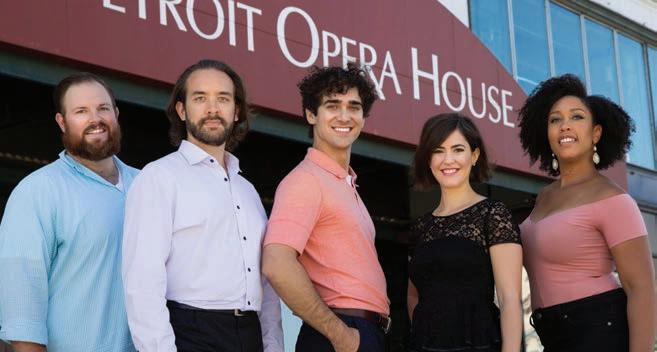
Coming to Detroit from all different areas of the country, these early career opera professionals gain valuable experience through myriad performance opportunities in main stage and community productions, and hone their skills through master classes and training with an array of world-class professionals, guest artists, and coaches.
Throughout their residency, Studio Artists receive advanced individual training from MOT’s Director of Resident Artist Programs Richard Leech, MOT Founder and Artistic Director David DiChiera, Studio Principal Coach/Accompanist Tessa Hartle and MOT’s Assistant
Supported by a major grant from the William Davidson Foundation, the program serves as a central component of MOT’s enhanced presence in the community through productions in the Detroit Opera House, community venues, recitals and special events. MOT’s community initiative productions are now selected and mounted specifically for the Studio Program. This season the studio artists will fill lead and featured roles in MOT’s production of Mark Adamo’s Little Women. Following last season’s The Tender Land, MOT fulfills its community initiative to produce a full-scale opera annually in venues throughout Metro Detroit.
American tenor Richard Leech is one of the most celebrated tenors of his generation. From the Met to Vienna and Carnegie Hall to the Hollywood Bowl, for more than three decades he made his home on the stages of the world’s great opera houses and symphonies. He is also a professor of voice and opera with Rutgers University. His leadership role with MOT Studio allows Mr. Leech to utilize all aspects of his broad experience as he oversees the development of some of opera’s most exciting emerging artists and brings their performances to our stage and into our community.
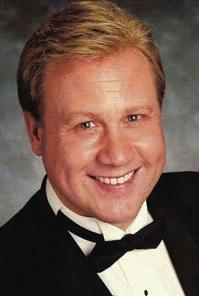 Music Director Suzanne Mallare Acton.
Music Director Suzanne Mallare Acton.
Conductor and Chorus Master
From Handel’s Messiah to contemporary jazz, Conductor Suzanne Mallare Acton is recognized for her versatility and dynamic style. For Michigan Opera Theatre, Ms. Acton’s conducting credits include West Side Story, Il Barbiere di Siviglia, The Music Man, The Pirates of Penzance, The Mikado, La Boheme, Die Fledermaus, La Traviata, A Little Night Music, The Daughter of the Regiment, Carmina Burana with members of Cirque du Soleil, The Medium, and Les Pecheurs de Perles. Additional credits include My Fair Lady and La Traviata for Dayton Opera, The Merry Widow and Madama Butterfly for Artpark, La Traviata, Gianni Schicchi and L’Elisir D’Amore for Verdi Opera Theatre, Il Barbiere di Siviglia, La Traviata and Carmen for the Wharton Center, and Tosca for Augusta Opera.
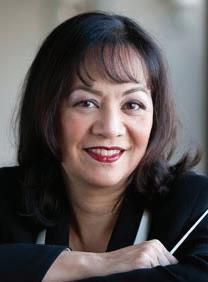
Symphonic concerts include the Detroit Chamber Winds and Strings, the Birmingham-Bloomfield Symphony Orchestra, The Lexington Bach Festival, and the Saginaw Bay Symphony Orchestra. In 1996, Ms. Acton was appointed Artistic and Music Director of Rackham Choir. Under her leadership, the Rackham Choir was awarded the 2008 Governor’s Award for Art & Culture.
Lawrence Edelson makes his debut at Michigan Opera Theatre directing Mark Adamo’s Little Women. Lawrence’s critically acclaimed productions have included the American premiere of Telemann’s Orpheus for Wolf Trap Opera, Philip Glass’s Hydrogen Jukebox for Fort Worth Opera, La Traviata for The Minnesota Opera, Il Postino for Opera Saratoga, the world premiere of Buried Alive (Myers/Long) for Fargo Moorhead Opera, and the New York premiere of Fauré’s rarely produced Pénélope for Manhattan School of Music. He was a guest member on the directing staff of New York City Opera, where he restaged Little Women twice: for the work’s Lincoln Center premiere and for the company’s tour to Japan. From 2008 to 2012, Lawrence was also a faculty member at the International Vocal Arts Institute in Tel Aviv, where he led seminars on American opera, and directed original productions of Little Women (Israeli premiere), A Midsummer Night’s Dream, Werther, Ariadne auf Naxos, and Eugene Onegin. This summer, Lawrence will direct and choreograph a major new production of Marc Blitzstein’s The Cradle Will Rock at Opera
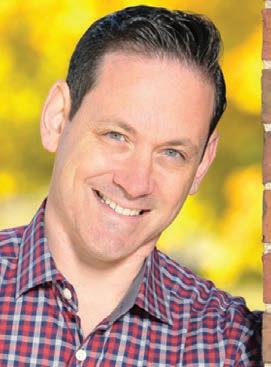
Saratoga. Before focusing on directing and arts administration, Lawrence enjoyed a performing career in both ballet and opera. He studied voice and musicology at The University of Ottawa and dance at The Joffrey Ballet School in New York City. As a dancer, he performed with Boston Ballet, Ballet West, and BalletMet Columbus. He has choreographed for ballet and opera companies around the country. As a singer, he appeared in opera, oratorio and musical theater internationally. Lawrence completed his master’s degree in performing arts administration at New York University and currently serves both as the Artistic and General Director of Opera Saratoga; and Producing Artistic Director of American Lyric Theater (ALT) in New York City, which he founded in 2005. At ALT, Lawrence has worked closely with composer/ librettist Mark Adamo for ten years mentoring the next generation of opera composers and librettists through The Composer Librettist Development Program, the only full-time program for emerging operatic writers in the country.
VIOLIN I
Eliot Heaton , Concertmaster+
Laura Roelofs+
Andrew Wu+
VIOLIN II
Victoria Haltom , Principal+
Daniel Stachyra+
Molly Hughes+
VIOLA
John Madison , Principal+
Scott Stefanko+
CELLO
Nadine Deleury, Principal +
Stefan Koch ^
BASS
Derek Weller, Principal+
FLUTE
Laura Larson, /Picc Principal +
OBOE/ENGLISH HORN
Nermis Mieses, Principal+^<
CLARINET
Brian Bowman, Principal+
BASSOON/ CONTRABASSOON
Gregory Quick , Principal+
HORN
Andrew Pelletier, Principal+
PERCUSSION
John Dorsey+
David Taylor
PIANO AND SYNTHESIZER
Tessa Hartle
+ Michigan Opera Theatre Core Orchestra
Detroit Federation of Musicians Local #5
American Federation of Musicians
Voice Type: Lyric Tenor
Age: 29
Hometown: New York, NY
Training: Frank Sinatra School of the Arts; Conservatory of Music at Purchase College S.U.N.Y.; University of Georgia
Past Roles: Rodolfo (La Bohème); B.F. Pinkerton (Madame Butterfly); Edgardo (Lucia di Lammermoor); E.T.A. Hoffmann (Les Contes d’Hoffmann); Tamino (Die Zauberflöte);
Nemorino (L’elisir d’amore); Don Jose (Carmen); Frederick (Pirates of Penzance); Ralph Rackstraw (H.M.S. Pinafore); Camille (Merry Widow ); Eisenstein (Die Fledermaus); Albert ( Albert Herring ); Martin (The Tender Land );
Gastone (La Traviata)
Current/Future Roles: Theodore “Laurie” Lawrence (Little Women); Trin (Girl of the Golden West )
InFebruary of 2014
Mr. Brent made his role debut as Nemorino in the University of Georgia Opera Theater’s production of Donizetti’s Elixir of Love (L’elisir d’amore). Nemorino marked Mr. Brent’s ninth leading tenor role with the UGA Opera Theater, under the direction of Metropolitan Opera Baritone Frederick Burchinal. Additionally, he was named the first recipient of the Carl Hoveland Opera Fellowship 2013/2014. Mr. Brent had two major debuts in November of 2013. He made his Carnegie Hall debut singing the roles of Wagner and Nereo in The Collegiate Chorale’s presentation of Boito’s Mefistofele and his role debut as Don Jose in Carmen with the UGA Opera Theater. In the Summer of 2013 Mr. Brent sang the title role in Jacques Offenbach’s fantasmagorical Les Contes d’Hoffmann (The Tales of Hoffmann) with the Martina Arroyo Foundation’s Prelude to Performance program. Throughout the summer he performed excerpts from Les Contes d’Hoffmann, including three live-streamed master classes for opera super-stars Eric Owens, Richard Leech and Maestro Tito Capobianco. Following the success of Mr. Brent’s Hoffmann, he was invited, by the New York-based Collegiate Chorale, under the direction of James Bagwell, to sing at the Verbier Festival in Switzerland. Mr. Brent returned to the University of Georgia in August 2013 to complete a Doctor of Music degree.

What is your favorite opera and why?
I do not usually think in terms of favorite, usually, the opera I am working on becomes my “favorite.” Salome is the opera that had the most profound impact on me. It was the first opera that I had decided to track the score and literal translation while listening to a recording. The opera unfolded in front of me as I listened, and I literally fell out of my chair in my room when the final chords of the opera were struck.
What has been your favorite performance experience?
My favorite experience on stage as a singer was during a performance as E.T.A. Hoffmann in my second production of Offenbach’s Les Contes d’Hoffmann. I recall in the epilogue of Offenbach’s Les Contes d’Hoffmann: Hoffmann has spent the last three hours recounting — in vivid, Bacchic, and poetic detail — three moribund, fantasmagorical stories of love and loss (framed by the tale of Kleinzach). At this point in the opera Hoffmann is destroyed; he remains not a man, but rather a vestige: unraveled, an inebriated puddle of despondent tears and trauma. I felt, in that moment, so deeply connected to the character, and so well rehearsed, that there was no concept of a performance any longer but real extemporized communication between real people. It’s difficult to explain but very special.
I do not have a dream role in my fach, but I have always wanted to sing Iago, from Verdi’s Otello. I have
also dreamed of singing “Come in quest’ora bruna” from Verdi’s Simon Boccanegra, the aria for Amelia Grimaldi.
What’s been the best part about being in the Michigan Opera Theatre Studio program?
The best part of being in the MOT Studio — outside of the obvious and unquantifiable benefit of bringing roles to life at a high level, sharing the Detroit Opera House stage with some of the most respected singers of the opera world and continuing to hone my craft with the input from a growing list of lauded industry professionals (conductors, coaches, and celebrated opera stars) — is fostering a relationship with the patrons of this opera company, from board members to season ticket subscribers to the casual, once-aseason, single ticket adventurer, who demonstrate their nearly quenchless thirst for this art form and deep, unparalleled love for the city of Detroit.
What’s the best part about living in Detroit?
The best part about living in Detroit has been witnessing and participating in its renaissance. Anthony Bourdain once likened the collapse of Detroit with the fall of Ancient Rome: the ruins of its Packard Automotive Plant to the Coliseum or Forum. It’s exciting to be a part of the stimulus.
If you weren’t an opera singer, what would you be?
I don’t know, probably anything.
What is one thing people would be surprised to know about you?
I enjoy knitting.
Voice Type: Baritone
Age: 28
Hometown: Baton Rouge, LA
Training: LSU BM Vocal Performance, University of Cincinnati CCM MM Vocal Performance
Past Roles: William Dale, Silent Night Michigan Opera Theatre 2016; Dancairo, Carmen Michigan Opera Theatre 2016; Marcello La Bohème Martina Arroyo: Prelude to Performance 2016; Papageno (Cover) The Magic Flute, Michigan Opera Theatre 2016; SS Officer #1 The Passenger, Michigan Opera Theatre 2015; Schaunard La Bohème, Michigan Opera Theatre 2015; Owen Hart Dead Man Walking Dayton Opera 2015; The Bonze Madama Butterfly Michigan Opera Theatre 2014; Germont (Cover) La Traviata Des Moines Metro Opera 2014; Frank/ Interrogator/ Sen. McCarthy Fellow Travelers Cincinnati Opera: Opera Fusion 2013; Pilate St. John Passion CCM Opera 2013; Balstrode (Cover) Peter Grimes Des Moines Metro Opera 2013; Sprecher Die Zauberflöte CCM Opera 2013; Figaro Le Nozze di Fiagro Opera d’Arte- CCM 2013; Leporello Don Giovanni Natchez Festival of Music 2012; The Mikado The Mikado Natchez Festival of Music 2012; Dapertutto, & Dr. Miracle Les contes d’Hoffmann Seagle Music Colony 2011; The Old Doctor Vanessa LSU Opera 2010; Tom Carter Hotel Casablanca Seagle Music Colony 2009
Current/Future Roles: John Brooke Little Women Michigan Opera Theatre 2017; Sonora (Jack Rance Cover) Girl of the Golden West Michigan Opera Theatre 2017
Jeff Byrnes is excited to return to the company this season as an artist of the Michigan Opera Theatre Studio. Last season, Jeff performed the role of Old Servant in Elektra and The Bonze in Madame Butterfly. Prior to joining MOT, he performed the role of Owen Hart in Dead Man Walking with Dayton Opera, and he covered Germont in La Traviata and Balstrode in Peter Grimes with Des Moines Metro Opera. Other operatic highlights include Leporello in Don Giovanni and the title role in The Mikado with the Natchez Opera Festival, and Figaro in Le nozze di Figaro, Sprecher in Die Zauberflöte, and Pilate in St. John Passion with CCM Opera. He was a regional finalist in the Rocky Mountain Region of the Metropolitan Opera National Council auditions in 2014, and he was awarded the Encouragement Award in the New Orleans district in 2010. Jeff has also participated in the young artist programs at Dayton Opera, Des Moines Metro Opera, and the Seagle Music Colony. He is a graduate of the University of Cincinnati College-Conservatory of Music and Louisiana State University. Last season at MOT, he appeared as Schaunard in La Bohème and Top in The Tender Land.

Q: What is your favorite opera and why?
A: My favorite opera is definitely Puccini’s La Bohème. I really like Puccini’s ability to bring out so much humanity and youth in his scoring of Illica and Giacosa’s brilliant libretto. Plus, how many operas do you get to run around stage and fight with random household items?
Q: What has been your favorite performance experience?
A: My favorite performing experience would have to be MOT’s recent production of Silent Night. This piece is so important and it was such a fulfilling experience to be able to bring it to one of my “home” companies.
into as a singer, actor, and human. Not to mention, Verdi wrote some pretty killer music!
Q: What’s been the best part about being in the Michigan Opera Theatre Studio program?

A: For me the best part of being in the Michigan Opera Theatre Studio program is the caliber of artists we get the opportunity to perform with. You learn so much by just being able to watch these people work and performing alongside them.
Q: What’s the best part about living in Detroit?
A: One of my favorite things is the strong sense of community Detroit has. It is a city that has gone through a lot and has banded together because of it. It is exciting to be able to be a part of the community.
Q: If you weren’t an opera singer, what would you be?
A: I would probably be a cook. Being a good Southerner I love to cook for people and I enjoy the rush of a kitchen.
Q: What is one thing people would be surprised to know about you?
Q: What is your dream role?
A: My dream role is Rigoletto. For me this role has everything. It combines lyric, dramatic, and buffo singing all into this tormented man who is stripped of everything. Rigoletto gives you so much to sink your teeth
A: I love the outdoors. I really enjoy hiking, camping, fishing, and generally being outside! I ride in a Mardi Gras parade. I am a member of the Krewe of Endymion, and I ride with my dad, except the past two years when I have performed during Mardi Gras weekend!
Voice Type: Mezzo-Soprano
Age: 30
Hometown: Malvern, PA
Training : Davidson College, BA Theater
Manhattan School of Music MM Vocal Performance
Past Roles: Madeleine Audebert (Silent Night ), Michigan Opera Theatre 2016; Mércèdes (Carmen), Michigan Opera Theatre 2016; TV Announcer – Play by Play (Bum Phillips: An All-American Opera) Monk Parrot, Inc. 2015; Carmen (Carmen), Opera in the Heights 2015; Mércèdes (Carmen), Knoxville Opera 2015; L’écureuil/La chatte (L’enfant et les sortilèges) Bare Opera 2015; Giulietta (Les contes d’Hoffmann), Santa Fe Opera 2015; Rachel (Harriet Tubman: When I Crossed That Line to Freedom) American Opera Projects, Brooklyn 2014; Prince Orlofsky (Die Fledermaus) Sarasota Opera 2013; Laura (Iolantha) Opera Slavica 2013

Current/Future Roles: Jo (Little Women ) Michigan Opera Theatre 2017, Wowkle (La fanciulla del West ) Michigan Opera Theatre 2017; Arsamenes cover ( Xerxes), Annie (Porgy and Bess) Glimmerglass 2017
Hunter hails from Malvern, Pennsylvania where she was a student in the Great Valley School District, recognized for their strong music and theater programs. In 2000 she had the unique pleasure of working with Tony and Academy Award winning playwright Mark Medoff in a production of his play Gunfighter–A Gulf War Chronicle.Ms. Hunter attended Davidson College in Davidson, North Carolina and found herself on the stage once again, this time under the direction of the Royal Shakespeare Company in an original production double billed Infinite Variety/For Every Passion Something. The show would also have her call upon her vocal abilities as she presented “The Willow Song” from Rossini’s Othello in addition to playing the roles of Hippolyta in A Midsummer Nights Dream and Lord Westmorland in Henry IV: Part I. The show debuted on the campus of Davidson College, and continued performances in the Fringe Festival in Scotland for an additional two week run. Back in North Carolina, Ms. Hunter went on to play Livia in Women Beware Women by Thomas Middleton; J.S. in Necessary Targets and “The Little Coochie Snorcher That Could” in The Vagina Monologues, both by Eve Ensler; and Karla in Wonder of the World by David Lindsey-Abaire. No stranger to the music department, she also performed in opera scenes including 2nd Lady in Die Zauberflote and Countess in Le nozze di Figaro, and the title role
of Josephine in a full production of Gilbert and Sullivan’s HMS Pinafore. The Davidson Concert Choir awarded her the solo in John Corigliano’s Fern Hill. She went on to attend the prestigious Manhattan School of Music for Classical Voice where she performed in mainstage productions with the opera department (Summer and Smoke, La vida breve, Of Love and Loss: Opera Scenes, and The Ghosts of Versailles).
What’s your favorite opera and why?
Madama Butterfly, because it’s impossible for me to watch it or listen to it and not cry. That music pulls on my heartstrings.
What has been your favorite performance experience?
My very first, “Carmen” in Carmen It may seem trite, but it was the first time I was really able to fill up the stage with such an incredible character. It helped that I had the privilege of working on it with Marilyn Horne, one of the greatest mezzos of all time, and many of my colleagues became lifelong friends.

What is your dream role?
Azzucena from Il Trovatore. It’s a monster of a role, but man is it good.
What’s been the best part about being in the Michigan Opera Theater Studio?
My colleagues! I love our studio family.
What’s the best part about living in Detroit?
Watching it grow right before my eyes, so many new things sprouting up like flowers out of the rubble.
If you weren’t an opera singer, what would you be?
A psychologist/therapist, specializing in performing artists
What is the one thing people would be surprised to know about you? I am also a fine artist (drawing, painting, sculpting), but I don’t get to create new things as much as I’d like to these days.
Voice Type: Bass
Age: 26
Hometown: Owosso, MI
Training : Hope College, BM Piano Performance, University of Northern Iowa, MM Vocal Performance; Young Artist: Central City Opera, Des Moines Metro Opera, Kentucky Opera, Sarasota Opera and upcoming Glimmerglass young artist
Past Roles: Michigan Opera Theatre: Colline (La boheme), Zuniga (Carmen), The Speaker (The Magic Flute), Grandpa Moss (The Tender Land )
Current/Future Roles: Friedrich Bhaer (Little Women), Ashby (Girl of the Golden West ), Le Marquis de Bresaille (Cyrano) Glimmerglass: Ariodates (Serse) and The Commentator (Scalia/Ginsburg )
Acclaimed by Opera News as a “standout,” young American bass, Brent Michael Smith, is a rising star whose rich voice and charming persona have attracted the attention of companies across the United States.
Brent returns to Michigan Opera Theatre (MOT) as a Resident Artist for the 2016-17 season. His roles at MOT this season include: Zuniga in Carmen, the British Major in the Pulitzer Prize-winning opera, Silent Night, by Kevin Puts, Friedrich Bhaer in Little Women, Ashby in Girl of the Golden West and Marquis de Bresaille in David DiChiera’s Cyrano. In February, Brent made his debut with Toledo Opera, performing Antonio in Le nozze di Figaro.

During his first season as a Resident Artist with MOT, Brent made his debut as Colline in La Bohème. Other notable roles that season were the Second SS Officer in The Passenger, Grandpa Moss in The Tender Land, The Doctor in Macbeth and the Speaker in The Magic Flute.
In the summer of 2017, Brent will make his mainstage debut with the Glimmerglass Festival as one of their young artists. He will sing Ariodates in Serse as well as the Commentator in Derrick Wang’s opera Scalia/Ginsburg
In 2015, Brent sang Harry Hopkins in the world premiere of Daron Hagen’s A Woman in Morocco, as a part of Kentucky Opera’s American Opera Initiative.
Brent has also been a young artist with Sarasota Opera, Central City Opera and with Des Moines Metro Opera where Colorado Music Buzz praised him for “making the most of his brief appearances” as Billy Jackrabbit in Girl of the Golden West.
Brent received his master of music degree from the University of Northern Iowa (UNI), singing under the tutelage of John Hines. He received his bachelor’s degree in music from Hope College (Holland, MI), majoring in piano performance and minoring in Spanish. He studied voice with Linda Dykstra.
Brent is a first-place winner of the Grand Rapids Opera Competition (2012).
What is your favorite opera and why?
My favorite opera is, in fact, a show we are producing this spring at MOT: Girl of the Golden West. The music is full of heartfelt beauty as well as luscious harmonies that overwhelm my emotions. The themes of homesickness and forgiveness are prevalent in this opera, which I believe are relatable to every person. What is more, it is full of joy and humor—feelings that we need more of in our world.
What has been your favorite performance experience?
My favorite performance experience at MOT was our production of The Passenger. While my role was not large, I felt the incredible power of the work and how it impacted the audience as well as my fellow performers. The set was the most monumental I have ever worked with, and the cast was the largest I have encountered. It was all very inspiring to see how each character was an essential cog piece in the metaphorical clock that was the opera; we each added a specific element to the story thereby imbuing it with emotional strength and dramatic power.
What is your dream role?
I have a few dream roles, among them are: King Philip in Don Carlos by Verdi, Maometto II in Rossini’s opera of the same name and Giorgio in I Puritani by Bellini.
What’s been the best part about being in the Michigan Opera Theatre Studio program?
The best part about being in the MOT studio program has been performing on the great stage of the Detroit Opera
House in every production. Many say that performing on stage in front of an audience is the best way to grow as an artist, and they are right. Each role, whether it is a large supporting role or a small comprimario role, has taught me pivotal things about my artistry.
What’s the best part about living in Detroit?
I love being in Detroit. It is my favorite city in America. Being a native Michigander, it is such a joy seeing this city rise above its nadir and transform into a better place for all. It is a city filled with amazing things to do, places to eat and to drink. It also has some of the most gorgeous architecture of any city in the country. However, its greatest attribute is its people, who possess such strength and resilience. The people who have been here for a long time inspire me. They have weathered the storms and continued to contribute their time, talents and energy to making this city great. It is truly an honor to have lived here and to have made so many friends.
If you weren’t an opera singer, what would you be?
If I were not an opera singer I would most likely be involved with city planning or development. I have such an obsession with all things development and city operations, especially ecosystems of neighborhoods and buildings.
What is one thing people would be surprised to know about you?
One thing people would be surprised to know about me is that I love to read Agatha Christie novels. I have read nine in the past five months.
Voice Type: Soprano
Age: 30
Hometown: Grosse Pointe Woods, MI
Training: University of Notre Dame, New England Conservatory, Universität Mozarteum Salzburg
Past Roles: Susanna, Le nozze di Figaro, Toledo Opera 2017; Frasquita (Micaëla cover), Carmen, Michigan Opera Theatre 2016; Papagena (Pamina cover), The Magic Flute, Michigan Opera Theatre 2016; Laurie, The Tender Land, Michigan Opera Theatre 2016; Yvette, The Passenger, Michigan Opera Theatre 2015; Musetta (cover), La bohème, Michigan Opera Theatre 2015; Clorinda, La Cenerentola, Opera Roanoke 2015; Adina, L’elisir d’amore, Eugene Opera 2014; Pamina, Magic Flute School Programs Tour, The Metropolitan Opera Guild 2014; Cleopatra (cover), Giulio Cesare in Egitto, Opera Roanoke 2014; High Priestess, Aïda, Michigan Opera Theatre 2013; Marzelline, Fidelio, Michigan Opera Theatre 2013; Johanna, Sweeney Todd, Syracuse Opera 2013; Mabel, Pirates of Penzance, Eugene Opera 2012; Frasquita (Micaëla cover), Carmen, Opera Roanoke 2012; Barbarina, Le nozze di Figaro, Michigan Opera Theatre 2011; Monica / Soprano (covers), The Medium / Carmina Burana, Michigan Opera Theatre 2011; Nannetta (cover), Falstaff, Utah Opera 2011; Beth, Little Women, Utah Opera 2011; Taumännchen (Dew Fairy), Hänsel und Gretel, Utah Opera 2011
Current/Future Roles: Beth March, Little Women, Michigan Opera Theatre 2017
Thisseason, soprano Angela Theis made her debut with Toledo Opera as Susanna in Le nozze di Figaro. As a perennial favorite of Michigan Opera Theatre, she has performed Frasquita in Carmen, Papagena (Pamina cover) in The Magic Flute, Laurie in The Tender Land, Yvette in The Passenger, the High Priestess in Aïda, Marzelline in Fidelio, and Barbarina in Le nozze di Figaro. Around the country, opera credits include Clorinda in La Cenerentola and Frasquita in Carmen (Opera Roanoke), Adina in L’elisir d’amore and Mabel in Pirates of Penzance (Eugene Opera), Johanna in Sweeney Todd (Syracuse Opera), and Beth in Little Women and the Dew Fairy in Hansel and Gretel (Utah Opera). She has been honored with numerous grants and awards, most notably as a fellow to study under soprano Barbara Bonney at the Universität Mozarteum Salzburg in Austria. Ms. Theis is an original member of the Michigan Opera Theatre Studio where she is currently in her second year as the soprano resident artist.
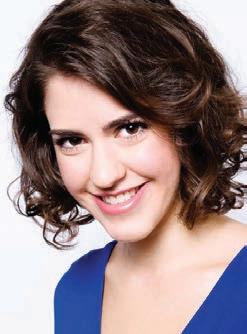
What is your favorite opera and why?
Le nozze di Figaro; by Mozart, and I’m not saying that because I performed it earlier this year! From the moment its famous overture begins, the energy is excitingly palpable, and the music is elegant and clever in a manner only Mozart perfected. The characters and drama are very human, honest, and often humorous, and at the end of the opera, forgiveness prevails—something our world desperately needs. The music is just so infectious and makes me smile!
which is a huge blessing and privilege (not to mention, a huge undertaking since it’s the longest female role in the opera repertoire)! She is so smart, joyful, and strong. Even though the opera has her fiancé’s name in the title, she is the one behind everything!
What’s been the best part about being in the Michigan Opera Theatre Studio program?
The best part about this program is the support of the deeply dedicated MOT staff and the exceptionally experienced guest coaches that work with us on a regular basis to help us reach our goals.
Q: What’s the best part about living in Detroit?
What has been your favorite performance experience?
I’ve never had so much fun on stage as I did singing Gretel in Hansel and Gretel by Humperdinck. I had a brilliant conductor and stage director, who set it in Depression-era Midwest cornfields. It was dramatically so fresh and musically very rewarding to sing over an almost Wagner-like large orchestration.
What is your dream role?
Susanna in Le nozze di Figaro is my dream role. I sang it earlier this year,

A: Getting to work at my hometown opera company (I am honored to have been in the Studio program for its first two inaugural years)! My family lives in the area, so I really enjoy sharing my performances with them and also spending my free time with them.
Q: If you weren’t an opera singer, what would you be?
A: I would be working in marketing for a non-profit, because I like helping organizations connect with their patrons (which I basically get to do as a singer for MOT)!
Q: What is one thing people would be surprised to know about you?
A: I love British drama and comedy!
Hailed as “spectacular” and the “epitome of vocal fireworks,” Canadian Soprano Clodagh Earls made her Michigan Opera Theatre debut in 2015 performing in Robert Xavier Rodriguez’s Frida, Lehar’s The Merry Widow, Gounod’s Faust, and returned to MOT in 2016 as Mrs. Jenks in Copland’s The Tender Land. Ms. Earls also performed as Eve in the criticallyacclaimed North American operatic premiere of Dove’s The Walk from the Garden with Rackham Choir and Orchestra. Ms. Earls holds a Master of Music (University of Toronto), and a Bachelor of Music (University of Western Ontario).
Praised for her “exceptionally beautiful mezzo,” Iowa native Laura Krumm is a 2013 graduate of the prestigious Adler Fellowship of the San Francisco Opera. In 2016-17, Ms. Krumm looks forward to a return to San Francisco Opera as Jovette in Manon and a Maid in Elektra, as well as role and company debuts performing Zerlina (Don Giovanni) for Nashville Opera, Mrs. Webb (Our Town) with Fresno Grand Opera, and Meg in Mark Adamo’s Little Women for Michigan
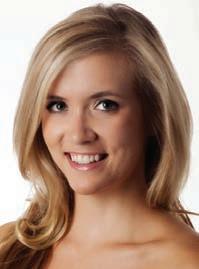
Opera Theatre. Last season, Laura made a return to the Lyric Opera of Chicago to cover Angelina in La Cenerentola and a role debut of Sister Helen Prejean (Dead Man Walking) for Fresno Grand Opera.
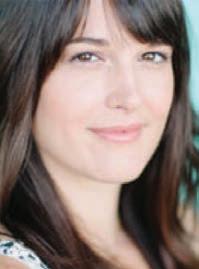
Aunt Cecilia
Diane Schoff performs regularly with Michigan Opera Theatre both as a part of the ensemble and in comprimario roles. Recent career highlights include the second lady in Mozart’s Magic Flute (May 2016) the Second Maid in Elektra (October 2014), Natalia Trotsky in Frida (March 2015), and Praskovia in the Merry Widow (May 2015) with MOT. Diane holds the honor of being a National Semifinalist in the Metropolitan Opera Competition and was an apprentice with San Francisco Opera’s Merola Program where she performed the roles of Pr. Orlofsky in Die Fledermaus and Zulma in L’Italiana in Algeri. Regional credits also include roles with Opera for the Young and Milwaukee Opera Theater. A recent transplant to the Detroit metro area, Diane sings at Grosse Pointe Memorial Church as soloist and section leader.

Gideon March
Mark has been the recipient of many awards and honors, most recently as the Grand Prize winner for the National Federation of Music
Clubs male voice division. He was a finalist in the Nicholas Loren International Vocal Competition, placed Second in the Andrews University
International Voice Competition and the Richardson Vocal Competition, and was awarded a Peabody Career Grant, a Peabody Talent Scholarship and the David Adamany Scholarship. Mark completed his Masters of Music from the Peabody Conservatory at the Johns Hopkins University. He holds a Bachelors of Music in Voice Performance and a Bachelors of Fine Arts in Theatre Performance from the Wayne State University.
Alma March
Mezzo-Soprano
Lisa Agazzi won First Prize and the Audience Choice Award at the San Diego District of the Metropolitan Opera National Council Auditions.
She has performed roles with San Diego Opera, Michigan Opera Theatre, Utah Opera and Indianapolis Opera. Her roles at these companies include: Fyodor in Boris Godunov, Mercédès in Carmen, Third Lady in Die Zauberflöte and Mrs. Segstrom in A Little Night Music
As a Young Artist with San Diego Opera, Utah Opera, Indianapolis Opera, Pine Mountain Music Festival, and the Musica Riva Festival, she toured the United States, Italy and
Mexico, singing roles including Dorabella in Cosí Fan Tutte, the title role in La Cenerentola and Lola in Cavalleria Rusticana. She has also sung Adalgisa in Norma with the South Florida Opera in West Palm Beach and Zita in Gianni Schicchi with the Verdi Opera Theatre of Michigan.

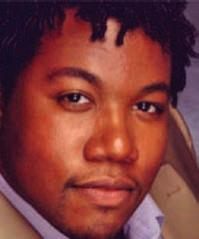
Mr. Dashwood
Branden C.S. Hood has recently performed the role of Ford in Falstaff with Opera MODO in Detroit. He has also performed in Weimar, Germany in Die lustigen weiber von Windsor as Falstaff and as Il Conte in Le Nozze di Figaro last year. Currently he is singing with Michigan Opera Theatre in its Community Outreach Program. In 2013 Mr. Hood performed the title role of Don Giovanni with The Lyric Opera of Weimar, in Wiemar, Germany. He was awarded with an Encouragement Award from the Michigan District of The Metropolitan Opera National Council Auditions in 2010.
He has attended the young artist programs of Prelude to Performance: Martina Arroyo Foundation, Pine Mountain Music Festival (2010), Opera Saratoga (Outreach Artist 2010), and Dayton Opera (2009). He earned his Bachelor of Music in Opera Emphasis/Vocal Performance at The Boston Conservatory in 2005. There he received The Presser Foundation Award and won the Encouragement Award from the Mario Lanza Institute. Mr. Hood received his Master of Music from The University of Michigan

in 2007, and studied with the late Shirley Verrett. In 2009, Mr. Hood received his Specialist Degree at The University of Michigan, studying with Prof. Stephen West.
Vocal Coach and Accompanist
Tessa Hartle joins the music staff of Michigan Opera Theatre this season and is currently a pianist/coach on the music staff of Opera Theatre of St. Louis. She has previously served on the music staffs of Florida Grand Opera, Virginia Opera, Sarasota Opera, Des Moines Metro Opera, Opera North, and Aspen Opera Theater Center. In addition to her work as a coach in the standard repertory, Tessa has also prepared and performed numerous new contemporary American works, most notably the world premieres of Greg Spears’ Paul’s Case (UrbanArias, Arlington, VA), and John Musto’s Later the Same Evening (University of Maryland Opera Studio.) She holds her bachelor’s degree in piano performance from the University of Michigan and her master’s degree in collaborative piano from the University of Maryland – College Park.

Monika Essen is an awardwinning, nationally recognized artist and designer. The recipient of the prestigious Detroit Free Press Lawrence DeVine Award for
Outstanding Contribution to Theatre, she studied interior architecture and environmental design at Parsons School of Design and received her MFA in scenography from the renowned Hilberry Repertory Company.

Ms. Essen has designed countless productions in theatre, opera, and film; recently designing MOT’s acclaimed productions of Frida, and Carmina Burana and The Medium. Additionally, she creates furniture, museum exhibits, interiors, and full sensory, multi-media environments for residential and commercial clients, including the Detroit Zoo.
Elizabeth Geck has been coordinating the Michigan Opera Theatre wig and make-up crew for the last seven years, as well as assisting the Wig and Makeup designer for main stage opera productions. Ms. Geck has assisted with several new productions including Aida, Cyrano, Margaret Garner, and Pearl Fisher. Elizabeth designed wigs and make-up for Motor City Lyric’s production of Amahl and the Night Visitors as well as Grosse Pointe Theater’s production of West Side Story.

Kendall Smith has designed lighting for more than 70 productions with MOT, making his debut in 1988 with The Ballad of Baby Doe , and most recently designed lighting for the company’s spring 2015 production of The Merry Widow. His work has been featured in numerous productions by respected companies, theaters, and festivals including Florida Grand Opera, Oregon Shakespeare Festival, Royal New Zealand Ballet, Minnesota Opera, and Walnut Street Theatre.

Robert
O’Hearn was a set and costume designer whose career spanned more than 60 years. In addition to Michigan Opera Theatre, Robert worked for the Metropolitan Opera, Opera Colorado, Miami Opera, San Francisco Opera and the New York City Opera for productions including Lucia di Lammermoor, L’italiana in Algeri, Porgy and Bess, Aida, West Side Story, Le nozze di Figaro and L’elisir d’amore, among others. He was a professor at the New York Studio and Forum of Stage Design and at the Jacobs School of Music at Indiana University Bloomington, where he created more than 30 opera and 14 ballet designs for the IU Opera and Ballet Theater.
Elizabeth Anderson, Production Coordinator and Artistic Administrator
Kathleen Bennett, Production Administrator
Ken Saltzman, Stage Manager
Hailli Ridsdale, Nan Luchini, Assistant Stage Managers
Nancy Krolikowski, Production Volunteer
Suzanne Mallare Acton, Assistant Music Director & Chorus Master
Jean Schneider, Repetiteur
Molly Hughes, Orchestra Personnel Manager
Tessa Hartle, Studio Coach/ Accompanist
Daniel T. Brinker, Technical Director
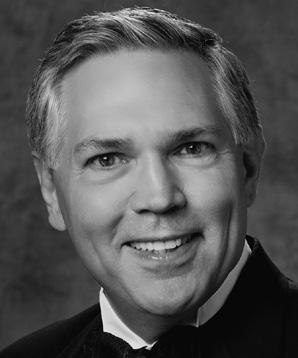
Monika Essen, Property Master & Scenic Artist
Heather DeFauw, Assistant Lighting Designer & Assistant Technical Director
Dee Dorsey, Supertitle Operator
Adrian Sean Polk, Technical Assistant COSTUMES
Suzanne M. Hanna, Costume Director
Rosemarie I. Di Rita, Wardrobe Mistress
Emily K. Clapp, Fitting Assistant
Susan A. Fox, First Hand
Maureen Abele, Patricia Pratt, Mary Ellen Shuffett, Stitchers
John Kinsora, Head Carpenter
Frederick Graham, Jr., Head Electrician
Pat McGee, Head Propertyman
Henry Ruiz, Head Sound
Robert Martin, Head Flyman
Gary Gilmore, Production Electrician
Mary Ellen Shuffett, Head of Wardrobe
IATSE Local #38, Stage Crew
IATSE Local #786, Wardrobe